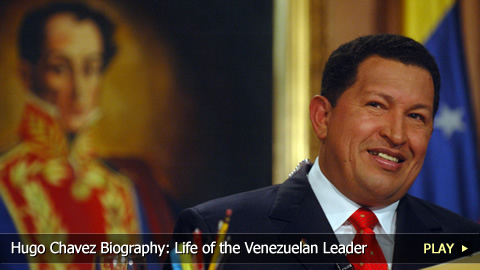Hugo Chavez Biography: Life of the Venezuelan Leader

Growing Up
Hugo Rafael Chávez Frías was born July 28th, 1954 in Sabaneta, Venezuela. Chávez was raised by his grandmother in poverty, but became interested in history and baseball while studying in Barinas.
Education
In 1971, Chávez enlisted at the Venezuelan Academy of Military Sciences. Because of his exposure to figures like Simón Bolívar, Karl Marx, and Che Guevara, his political views strengthened. He believed social justice was key to improving Venezuela's poor economic conditions. Following his 1975 graduation, the young army officer helped repress rebel groups like the Red Flag Party.
Military
However, Chávez's eyes were soon opened to the existing military and government corruption and the country's disproportionate wealth distribution that stemmed from Venezuela's oil reserves. Relating with the insurgents, he formed the Venezuelan People's Liberation Army to act as a bridge between the left-wing Red Flag and the right-wing Venezuelan government.
Revolutionary Bolivarian Movement-200
Soon, Chávez was teaching at the military academy. By 1982, he founded the group eventually known as the Revolutionary Bolivarian Movement-200, and convinced many students to join.
El Caracazo
Political unrest in Venezuela increased through the decade. In 1989, President Carlos Andrés Pérez's alignment with neoliberal policies caused the worst riots in the country's history. The government's reliance on force during El Caracazo resulted in hundred of deaths.
Operation Zamora
In 1992, Chávez and the MBR-200 undertook a coup d'état known as Operation Zamora in an attempt to overthrow Pérez. Despite his failure and arrest, Chávez instilled his followers with hope through his televised “por ahora,” or for now, speech.
Presidential Election
After being liberated from jail by President Rafael Caldera in 1994, Chávez spread his idea of a Bolivarian social revolution throughout Latin America. However, political discontent grew as economic conditions worsened, so in 1997 Chávez formed the Fifth Republic Movement and entered the presidential race. His pledge of social and economic change during the 1998 campaign resonated with voters, and he was inaugurated president of Venezuela on February 2nd, 1999.
First Presidential Term
During his first term, Chávez appointed new government officials, launched the Plan Bolivar 2000 social welfare program for the poor, and unveiled his own radio and television shows.
New Constitution
In December 1999, the country adopted a new constitution, which augmented protections for various groups, strengthened presidential powers in several government branches and put the military in charge of national safety, among other adjustments. It also changed the country's name to the Bolivarian Republic of Venezuela.
Second Presidential Term
Venezuelans elected Chávez to a second term in 2000's “megaelection” in the hopes he'd end political corruption. However, by working closely with Cuban President Fidel Castro and condemning the U.S. invasion of Afghanistan, Chávez exacerbated ties with the western world.
Capture
Though he had his share of defenders, or chavistas, support declined in the upper and middle classes. Along with anti-Chávez protests, opposition groups came together under the Coordinadora Democrastica de Accion Civica. A 2002 rally quickly turned into a violent struggle and resulted in Chávez's capture by the military.
Recall Referendum
Nevertheless, he returned to power several days later. Resistance to Chávez's regime continued, including a national strike involving the state-owned oil company. Chávez then poured funds into social initiatives, which helped him win in the 2004 recall referendum.
Third Presidential Term
After being elected to a third term in 2006, he launched his democratic Socialism of the 21st Century by bringing multiple enterprises under the government's control. He also combined all leftist and pro-Bolivarian Revolution parties into the United Socialist Party of Venezuela.
Constitutional Amendments
Several amendments were soon made to the constitution, including unlimited re-elections for public office. Meanwhile, Chávez gave monetary funding to Latin American countries and sought ties with fellow leftist and socialist governments in the region.
Cancer
In 2011, it was reported that Chávez was suffering from cancer; however, the leader asserted he was cancer-free ahead of the 2012 election.
Controversial Leader
While some believe Chávez has always acted for the good of Venezuela and Latin America, others cannot see past what they consider his authoritarian rule and the country's continued state of poverty. For these reasons, it cannot be denied that Hugo Chávez is one of the most influential and controversial leaders in South American history.
